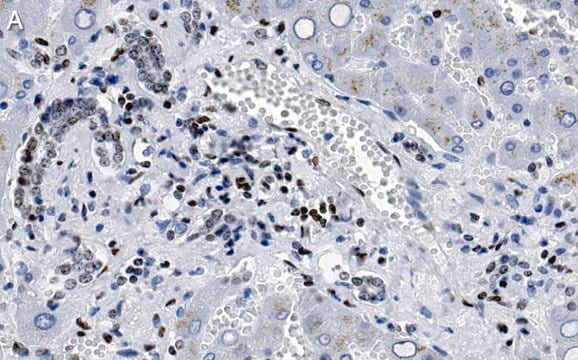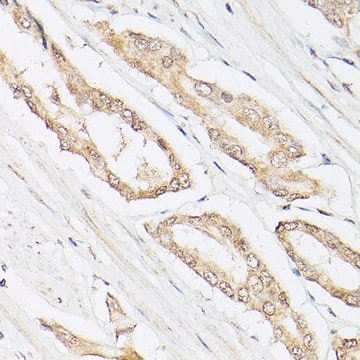M6818
Anti-MeCP2 antibody, Mouse monoclonal
clone Mec-168, purified from hybridoma cell culture
About This Item
ELISA (i)
ICC
WB
indirect ELISA: suitable
microarray: suitable
western blot: 0.1-0.2 μg/mL using nuclear cell extract of cultured Jurkat, human acute T cell leukemia cells, or cultured MCF7 human breast carcinoma.
Productos recomendados
biological source
mouse
Quality Level
conjugate
unconjugated
antibody form
purified from hybridoma cell culture
antibody product type
primary antibodies
clone
Mec-168, monoclonal
form
buffered aqueous solution
mol wt
antigen ~75 kDa
species reactivity
rat, human, mouse
packaging
antibody small pack of 25 μL
technique(s)
immunocytochemistry: suitable
indirect ELISA: suitable
microarray: suitable
western blot: 0.1-0.2 μg/mL using nuclear cell extract of cultured Jurkat, human acute T cell leukemia cells, or cultured MCF7 human breast carcinoma.
isotype
IgG1
UniProt accession no.
shipped in
dry ice
storage temp.
−20°C
target post-translational modification
unmodified
Gene Information
human ... MECP2(4204)
mouse ... Mecp2(17257)
rat ... Mecp2(29386)
General description
Immunogen
Application
Immunoprecipitation (1 paper)
Western Blotting (1 paper)
- immunoblotting
- immunoprecipitation
- immunostaining
- enzyme linked immunosorbent assay (ELISA)
- immunocytochemistry
- western blot (0.1-0.2 μg/mL using nuclear cell extract of cultured Jurkat, human acute T cell leukemia cells, or cultured MCF7 human breast carcinoma)
Biochem/physiol Actions
Physical form
Disclaimer
¿No encuentra el producto adecuado?
Pruebe nuestro Herramienta de selección de productos.
Optional
Storage Class
12 - Non Combustible Liquids
wgk_germany
nwg
flash_point_f
Not applicable
flash_point_c
Not applicable
ppe
Eyeshields, Gloves, multi-purpose combination respirator cartridge (US)
Elija entre una de las versiones más recientes:
Certificados de análisis (COA)
¿No ve la versión correcta?
Si necesita una versión concreta, puede buscar un certificado específico por el número de lote.
¿Ya tiene este producto?
Encuentre la documentación para los productos que ha comprado recientemente en la Biblioteca de documentos.
Nuestro equipo de científicos tiene experiencia en todas las áreas de investigación: Ciencias de la vida, Ciencia de los materiales, Síntesis química, Cromatografía, Analítica y muchas otras.
Póngase en contacto con el Servicio técnico








